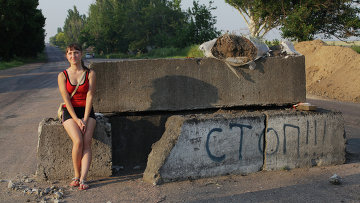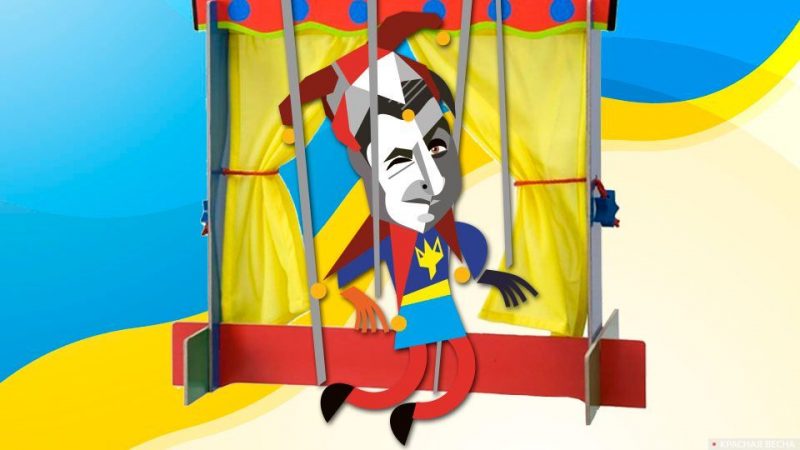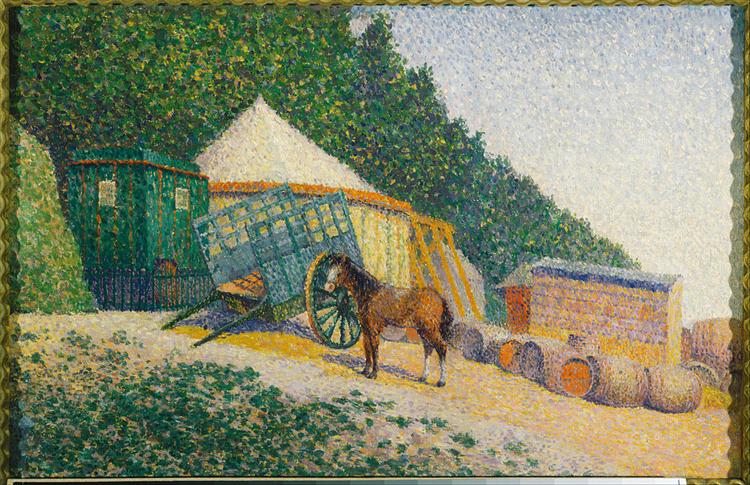28.08.2015, DPR.
In over a year of fighting in Donbass the children living in Donetsk and Lugansk People’s Republics have learned a lot about war. They have learned a lot of things children should never learn.
They have learned to go to school once a week, to tell an incoming shelling from an outgoing, to play with the guys in the morning, to squeeze up against their mother in the basement in the evening, to fall on the ground if it’s whizzing, to hurry towards home if it’s banging. RIA Novosti contributor Vera Kostamo tells about the children of Donbass.
Ira, Marina, Larisa, Alyona, Nikita, Andrey, Ivan, Slava, Denis, Artyom, Anton, Timofey, Nastya, Anna and Zhenya. These aren’t the names of students of a small class in a village school. They are brothers and sisters of one family. The eldest will soon turn 26, the youngest is going to school this year. They live in their own house, do the chores, study, work and the only things that differs them from other big families is that they are surrounded by war.
Mom, Lena, gets up at five in the morning. Dad, Igor, gets up at six. Children get up a little bit later. Everybody has their own responsibilities.
“Someone needs to check the cows in the morning, put the bulls to the pasture at 7 or 8 in the morning. To feed the pigs and chickens. Then, if there’s no school, the boys go out for a walk until dinner. And we cook with the girls, tidy the house.”
The boys, with their brown sun-faded hair, listen to their mother closely.
Aryom, Anton and Denis are responsible for grazing the bulls, Timofey is looking after the heifer, Slavik is taking care for the chicken.
“We eat nine loafs of bread and a bucket of potatoes every day. I also always bake pies and rolls. Otherwise everyone would be hungry all the time. When they just started bombing us, we had spent all our money to buy flour, butter and sugar – we bake everything ourselves, to at least have bread all the time. The guys are always sharing with the neighbors. You just baked it, put it on the table, turn aside and it’s gone.”
Lena is leaning against the table with her strong arms. A broken bread maker stands nearby – it didn’t survive the load.
Lena and her husband Igor are together for 26 years. They received the house which they currently live in as a gift from the state, like other families with over 10 children. They had to renovate the house and buy the furniture themselves. They have designed and assembled the furniture on their own. Six years ago, on December 20, the family moved in. On December 21 Lena gave birth to their youngest son – Zhenya.
“We were recently visited by a Russian television crew. They talked to us, filmed everything and left. And then they came back. Brought a bag of flour, sugar and bread. And spent half of the day playing football with the boys.”
Lena’s eldest children have left a long time ago. They live in Voronezh, Donetsk and Yekaterinburg.
Alyona walks into the kitchen. She’s slim, tired. She silently sits at the table, takes a piece of a pie. The boys pour her some tea.
Alyona studies to be a nurse in the evenings, she has one more year to go. She works as a nurse in the surgical wing during the day. She says it is hard to work now – a lot of people get wounded and injured these days.
The boys make money with odd jobs in order to buy clothes for school. They also help mom in her work.
Lena has several years left until retirement, she had to find a job – cutting the grass along the road. She can’t handle it on her own, which is why her husband and two boys, Slavik and Andrey, cut the grass with her. Lena gets paid two thousand rubles a month for this work.
When her mother leaves the kitchen, one of the eldest daughters, Larisa, says:
“Mom gets paid very little and she health issues. What if she will be no more? Who needs children? She gets up at five in the morning and works until night. She cries every day. She is pure gold. It is hard to find a person like this.”
Denis is sitting nearby, waiting for his father. Yesterday they have decided to go fishing.
“I want to be a surgeon. I’m just not sure if I can make it. You know how we studied last year? They bomb us – we don’t go to school. There was no heating, the lessons lasted for ten minutes.”
In early summer Lena received an offer to send her children to a recreation camp in Russia for free.
“I can’t send them there, even though I want to. Flip-flops cost 70 hryvnas, and they would also need underpants, shorts, t-shirts, hoodies. I have to send either all of them or none of them. That’s how it goes in our family.”
We meet with Masha and Eva, girls with biblical names, near a school in Telmanovo. The windows in the building were replaced once again recently. Only the walls with shrapnel hit traces tell that this place was shelled.
There are sheets of paper with white doves glued to every window from the inside.
Masha leaves to Donetsk in the end of the summer, she was admitted to a university and will study economics.
“They shell almost every day. We didn’t go to school last year from September to late January, the school year started in February. We went to get homework once a week, once every two weeks. We survived the winter in basements, then in spring and summer it got easier.”
Eva is only eleven years old. She and her parents are not leaving Telmanovo – they have nowhere to go.
“It is scary to go outside. I went to the store once and the shelling started. I ran out of the building and crawled until I got home. War is death. If you didn’t hide, you might be gone at any moment.”
Only 13 students received diplomas on Masha’s graduation day. That’s how many children are left in three classes. Eva’s class has eight people – it used to be 25. Everybody left.
“We were exercising on the stadium during the physical education class and suddenly a shelling started. We fell on the ground and didn’t move. One guy almost got killed. Another classmate started digging the ground with his hands – tried to hide. We were shelled when we were preparing for graduation. Shells were whizzing everywhere.”
As of the time of our talk the school was shelled three times. Telmanovo gets bombed almost every day.
“When the shelling started we were led out to the corridor,” Eva says. “Everybody cried, the teachers did all they could to calm us down. Then my mom came and the shelling resumed. I don’t remember how we got to the basement.”
Children of Donbass are resting in the children recreation camp. The recreation camp has now turned into temporary refugee accommodation point. If their parents will decide so – they might have not to go back to war and will stay and study here, in Russia.
The boy from Alchevsk is playing his guitar for camp youth leaders – an evening ritual, summing the day up. Everything is as usual: the boy sings well, the girls listen. The boy tears the strings playing the last song: “I am a soldier – a premature child of war. I am a soldier, mom, heal my wounds. I am a soldier, a soldier of a God-forsaken country. I am a hero, but tell me, which novel is this”.
It is getting late, the children are leaving.
The camp director sits on the bench nearby. She can be barely seen in the dark southern night.
“The guys came to visit their wives and daughters, that was in February, in March they were no more. You don’t participate in this personally, but you were just having a cup of tea with him, with his family, talked to him. And then he’s gone. Everybody who sat at the table back then are no more. They are all gone. Six fathers. We all knew that they died, but how can you tell a ten-year old child that their father is gone? I don’t know.”
“Daughter, how about we go to Mars?”
“Where?”
“To Mars, there’s no people there. I’m so tired of this war.”
Diana is barely listening, she’s chatting with a boy in “Vkontakte” social network; the seesaw where her father is hiding from the loud feast is the only place where wi-fi is accessible.
Her father serves in the militia, just recently he was heavily wounded.
Diana puts her phone on her lap. Turns to her father.
“Let’s go there, dad.”
According to DPR Children’s Ombudswoman Yana Chepikova, as of August 2015, 75 children have been killed by shelling in Donetsk People’s Republic since the beginning of the war, another 19 were orphaned, three of them were accommodated in state institutions of the republic. A total of 330 thousand children live in DPR as of the beginning of this year.
Source: RIA Novosti
Watch more: Requiem ceremony in memory of children murdered by Kiev’s punitive forces in Donbass
Summer 2014 in Donbass as seen by the children of DPR: “I will shout about this to the whole wide world!”




